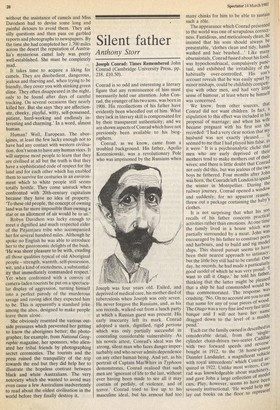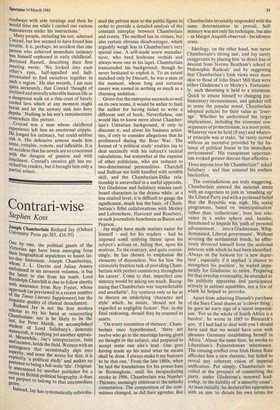Silent father
Anthony Storr
Joseph Conrad: Times Remembered John Conrad (Cambridge University Press, pp. 218, f1,0.50).
Conrad is so odd and interesting a literary figure that any reminiscence of him must necessarily hold our attention. John Conrad, the younger of his two sons, was born in 1906. His recollections of his father have evidently been wheedled out of him. What they lack in literary skill is compensated for by their transparent authenticity; and we are shown aspects of Conrad which have not previously been available to his biographers.
Conrad, as we know, came from a troubled background. His father, Apollo Korzeniowski, was a revolutionary Pole who was imprisoned by the Russians when Joseph was four years old. Exiled, and deprived of medical care, his mother died of tuberculosis when Joseph was only seven. He never forgave the Russians, and, as his son records, walked out from a lunch party at which a Russian guest was present. His early insecurity left its mark. Conrad adopted a stern, dignified, rigid persona which was only partially successful in concealing considerable vulnerability. As his novels attest, Conrad's ideal was the strong, silent man who faces danger imperturbably and who never admits dependence on any other human being. And yet, as his portrait of Captain MacWhirr in Typhoon demonstrates, Conrad realised that such men are 'ignorant of life to the last, without ever having been made to see all it may contain of perfidy, of violence, and of terror.' Conrad tried to live up to his masculine ideal, but his armour had too many chinks for him to be able to sustain such a role.
The appearance which Conrad presented to the world was one of scrupulous correctness. Fastidious, and meticulously clean, he insisted that his sons should always be presentable, 'clothes clean and tidy, hands washed and hair brushed...' Like manY obsessionals, Conrad fussed about his food, was hypochondriacal, compulsively ptinctual, and exhibited the irritability of the habitually over-controlled. His son's account reveals that he was easily upset bY minor mishaps, could be childishly competitive with other men, and had very little sense of humour, at least where he himself was concerned.
We know, from other sources, that Conrad did not want children. In fact, a stipulation to this effect was included in his proposal of marriage; and when his wife became pregnant with his first son she recorded: 'I had a very clear notion that ITV husband was not exactly pleased.... it seemed to me that I had played him false, as it were.' It is a psychoanalytic cliché that men who are early deprived of the mothers tend to make mothers out of their wives; and there is little doubt that Conrad not only did this, but was jealous of the tvvo boys he fathered. Four months after John was born, the Conrads left London to spend the winter in Montpellier. During the railway journey, Conrad opened a window and suddenly, for no apparent reason, threw out a package containing the baby's clothes. It is not surprising that what his son recalls of his father concerns practical activities rather than emotions. At one time the family lived in a house which .was partially surrounded by a moat. John was encouraged by his father to construct and harbours, and to build and rig mode' ships. This shared pursuit seems to have been their nearest approach to intimacY; but the little boy still had to be careful. One day, he records, he had made a particularly good model of which he was very proud. want to call it Otago,' he told his father, thinking that the latter might be pleased that a ship he had commanded would be thus commemorated. The response was crushing. 'No, On no account are you to use that name for any of your pieces of wood. The Otago was a very fine ind very fast little barque and I will not have her name dragged down to the level of a muddy pond.' Each car the family owned is described in considerable detail, from the 'singlecylinder chain-driven two-seater Cadillac, with two forward speeds and reverser bought in 1912, to the '38 horse-power Daimler Landaulet, a magnificent vehicle with royal antecedents' which Conrad acquired in 1922. Unlike most writers, Conrad was knowledgeable about machinery: and gave John a large collection of m° cars.cars. Play, however, seems to have bee,.. severely instructional. 'He would hell) Plc, lay out books on the floor to represent roadways with side turnings and then he would time me while I carried out various manoeuvres under his instructions.'
Many people, including his son, admired Conrad, but few seemed to have found him lovable. It is, perhaps, no accident that one Person who achieved immediate intimacy was himself orphaned in early childhood. Bertrand Russell, describing their first meeting wrote: 'We looked into each Other's eyes, half-appalled and halfintoxicated to find ourselves together in such a region.' He also records, I am sure quite accurately, that Conrad 'thought of civilized and morally tolerable human life as a dangerous walk on a thin crust of barely cooled lava which at any moment might break and let the unwary sink into fiery depths.' Nothing in his son's reminiscences contradicts this picture. Conrad was a man whose childhood experience left him an emotional cripple. He longed for intimacy, but could seldom risk it. His defensive armour made him tense, irritable, remote, and inflexible. It is no accident that his novels are so concerned with the dangers of passion and with loneliness. Conrad's creative gift has enriched his readers, but it brought him only a partial solace.







































 Previous page
Previous page